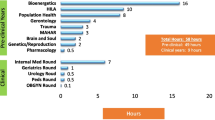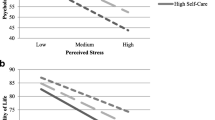Abstract
The purpose of this study was to explore the impact of a lifestyle medicine elective on medical students’ self-care behaviors. From fall, 2015, through spring, 2017, a lifestyle medicine elective was offered to first and second year medical students. Acquisition of data was approved by the IRB. Students attended four group sessions, two at the beginning and two at the end of the elective. At the first session, information about the effects of lifestyle on mental and physical health was presented. Students completed screening instruments to assess their own physical activity, nutrition, anxiety, and depression. At the next class, students received their scores. They chose one of three focus groups: nutrition, physical activity or stress management and set a specific goal in that area. At the end of the elective, students attended two group sessions, which focused on patient cases. They again completed the screening instruments, and received their scores. They also evaluated the course. Sixty-three students signed the consent form and provided data. Comparison of baseline scores by gender revealed that women had statistically significant higher scores on the depression screener than men, and lower physical activity scores than men. Pre and post elective comparison in the whole group showed statistically significant improvements in nutrition, depression, and anxiety (all p < .05). Further analysis in the focus groups demonstrated that the stress management group’s scores on anxiety were significantly improved. The nutrition group significantly lowered their fat consumption and increased their intake of fruits and vegetables (all p < .05). The physical activity group did not significantly increase their daily physical activity, although this analysis was limited by missing data and wide variability. Student evaluations of the course were positive. Medical students are able to make improvements in their own lifestyle behaviors while acquiring information that may be useful in later patient care.

Similar content being viewed by others
References
Abraham, C., & Michie, S. (2008). A taxonomy of behavior change techniques used in interventions. Health Psychology, 27(3), 379–387.
Bize, R., Johnson, J., & Plotnkoff, R. (2007). Physical activity level and health related quality of life in a general adult population: A systematic review. Preventive Medicine, 45, 401–415.
Block, G., Gillespie, C., Rosenbaum, E., & Jenson, C. (2000). A rapid food screener to assess fat and fruit and vegetable intake. American Journal of Preventive Medicine, 18(4), 284–288.
Brennan, J., McGrady, A., Lynch, D. J., Schaefer, P., & Whearty, K. (2016). A stress management program for higher risk medical students: Preliminary findings. Applied Psychophysiology and Biofeedback, 41(3), 301–305. https://doi.org/10.1007/s10484-016-9333-1.
Brennan, J., McGrady, A., Whearty, K., Lynch, D., Rapport, D., & Schaefer, P. (2012). Emotional status of third year medical students and their responses to a brief intervention. Annals of Behavioral Science and Medical Education, 18(2), 10–14.
Center for Disease Control. (2016). Healthy People 2020 Progress Review. Accessed February 10, 2017, from https://www.cdc.gov/nchs/hapdata2020.
Conley, C. S., Shapiro, J. B., Kirsch, A. C., & Durlak, J. A. (2017). A meta-analysis of indicated mental health prevention programs for at-risk higher education students. Journal of Counseling Psychology, 64(2), 121–140. https://doi.org/10.1037/cou0000190.
Davis, M., Eshelman, E. R., & McKay, M. (2008). The relaxation and stress reduction workbook (6th ed.). Oak Park: New Harbinger Publications, Inc.
Dyrbye, L., Satele, D., & Shanafelt, T. (2017). Healthy exercise habits are associated with lower risk of burnout and higher quality of life among U.S. medical students. Academic Medicine, 92(7), 1006–1011. https://doi.org/10.1097/ACM.0000000000001540.
Frates, E. P., Xiao, R. C., Sannidhi, D., McBride, Y., McCargo, T., & Stern, T. A. (2017). A web-based lifestyle medicine curriculum: Facilitating education about life- style medicine, behavioral change, and health care outcomes. JMIR Medical Education, 3(2), e14. https://doi.org/10.2196/mededu.7587.
Goetzel, R., Shechter, D., Ozminkowski, R., Stapleton, D., Lapin, P., McGinnis, J., … Breslow, L. (2007). Can health promotion programs save Medicare money? Clinical Interventions in Aging, 2(1), 117–122.
Hughes, C. (2011). Answers to your questions about Medicare annual wellness visits. FamPractManag, 18(2), 13–15.
Kroenke, K., & Spitzer, R. (2002). The PHQ-9: A new depression diagnostic and severity measure. Psychiatric Annals, 32, 509–521.
Lawlor, K., & Hornyak, M. (2012). SMART Goals: How the application of SMART goals can contribute to achievement of student learning outcomes. Developments in Business Simulations and Experiential Learning., 39, 259–267.
McGrady, A., Brennan, J., Lynch, D., & Whearty, K. (2012). A wellness program for first year medical students. Applied Psychophysiology and Biofeedback, 37(4), 253–260.
Muscato, D., Phillips, E., & Trik, J. (2018). Lifestyle medicine education collaborative (LMEd): “Champions of Change” medical school leaders’ workshop. American Journal of Lifestyle Medicine, 12(5), 382–386
Muscato, D., Phillips, E., & Trilk, J. (2015) Lifestyle medicine education collaborative. http://lifestylemedicineeducation.org/.
Musich, S., Wang, S., Hawkins, K., & Klemes, A. (2016). The impact of personalized prevention care on health care quality, utilization and expenditure. Population Health Management, 19(6), 389–397.
Olsen, J., & Nesbitt, B. (2010). Health coaching to improve healthy lifestyle behaviors: An integrative review. American Journal of Health Promotion, 25(1), e1–e10.
Olsen, J. (2014). Health coaching: A concept analysis. Nursing Forum, 49(1), 18–29.
Phillips, E., Pojednic, R., Polak, R., Bush, J., & Trilk, J. Including lifestyle medicine in under-graduate medical curricula. Medical Education Online. https://doi.org/10.3402/meo.v20.26150.
Physical Activity Policy, Health Improvement Directorate. (2009). General Practice Physical Activity Questionnaire. Retrieved April 2013, from https://www.gov.uk/government/publications/ general-practice-physical- activity-questionnaire-gppaq.
Spitzer, R., Kroenke, K., Williams, J., & Lowe, B. (2006). A brief measure for assessing generalized anxiety disorder: The GAD-7. Archives of Internal Medicine, 166, 1092–1097.
Acknowledgement
We thank Kim Abbas RDN LD for her assistance with the nutrition focus group.
Author information
Authors and Affiliations
Corresponding author
Additional information
Publisher’s Note
Springer Nature remains neutral with regard to jurisdictional claims in published maps and institutional affiliations.
Rights and permissions
About this article
Cite this article
McGrady, A., Badenhop, D. & Lynch, D. Effects of a Lifestyle Medicine Elective on Self-Care Behaviors in Preclinical Medical Students. Appl Psychophysiol Biofeedback 44, 143–149 (2019). https://doi.org/10.1007/s10484-019-09431-5
Published:
Issue Date:
DOI: https://doi.org/10.1007/s10484-019-09431-5




